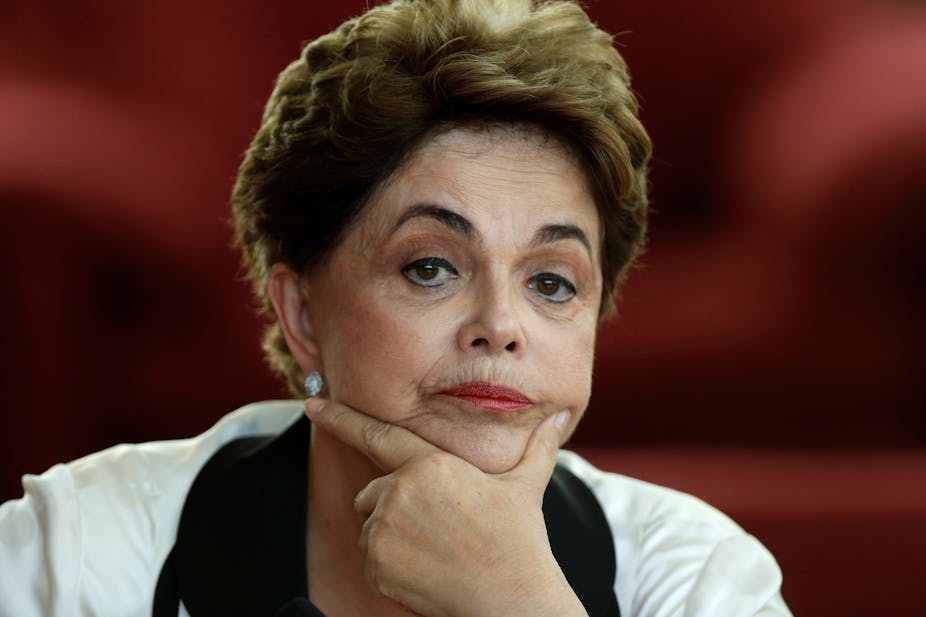In post-Olympic Brazil last week, Dilma Rousseff’s presidency came to a forced end. It was also the end of 13 years of radical and progressive politics from the left-wing Workers’ Party. There’s a lot to be learnt from the parliamentary coup, which was – in Rousseff’s words – lead by a bunch of “misogynist and wealthy white men”.
These events have strengthened the idea that Latin America, after a relatively short spring of democracy, is heading towards a new wave of right-wing coups. They are not military coups, though. In a post-Cold War world, military coups – such as the ones the region experienced in the 1970s and 1980s – would not go down well.
The new coup
These new breed of coups – white-glove coups, political coups, parliamentary coups or low-intensity coups as they have been labelled – are incubated inside the offices of the oligarchy and with the complicity of venal legislators, a shady judicial system and a docile commercial media under the political thumb of the financial elite.
This new breed of coups has been gaining pace since the end of the 1990s, when most Latin American countries began electing left-wing governments. The last of these governments was Rousseff’s, re-elected in 2014 by 54 million people and overthrown last week. The right-wing wave of coups is reaching a peak, with devastating effects.
It has shattered the presidential republican system in the largest Latin American country and its effects are already reaching the coast of Venezuela. There, Nicolas Maduro, a rather inept president, is under siege by the “rubios” – the blonde ones – as the former Hugo Chavez labelled his country’s financial and racial elite.
Rousseff was the third victim of this new breed of coups. Honduras’ Manuel Zelaya was overthrown in a 2009 coup d’état. Zelaya, a wealthy landowner, had committed a major political lapse, in that he shifted to the left and began adopting some socially progressive policies. His fate was sealed when he declared he would “force the business oligarchy to start paying what is fair”.
In Honduras something novel happened. While the military did the dirty work, they didn’t stay in power. Instead, power was swiftly handed over to Roberto Micheletti, a businessman closely aligned to Washington.
In Paraguay, Fernando Lugo, a left-wing former Roman Catholic archbishop who was democratically elected in 2008, was heading to a certain second term in office when the country’s landowners, the most-powerful sector in a mainly rural semi-feudal society, ousted his government in 2012.
Brazilian unrest
Michel Temer, the new non-elected president of Brazil, is a neocon with an approval rating of 14%. He also epitomises the new brand of non-elected right-wing presidents who reach power by non-democratic means. Achieving power by non-democratic means won’t ever mortify the right: it is the way the Latin American right has operated historically.
Brazil’s political right lost against the Workers’ Party in the 2002, 2006, 2010 and 2014 elections. With Luiz Inácio Lula da Silva, the historical leader of the Workers’ Party, as a potential presidential candidate in the 2018 elections, the Brazilian right was once again headed for certain defeat. The lesson from the coup against Lugo in Paraguay was learnt by the Brazilian right: stop the left from winning in the polls.
While the events in Brazil marked the third successful right-wing political coup against a left-wing government, there have been a further three unsuccessful attempts in Latin America.
In 2002, Venezuela’s media and oligarchy failed to topple the late president Hugo Chavez. In Bolivia in 2008, the Media Luna (half moon) – a coterie of the white rural elite from the country’s east – tried to overthrow Evo Morales, elected in 2006, and failed.
Also unsuccessful was the attempted 2010 coup against Ecuador’s Rafael Correa led by Lucio Gutierrez, a former neoliberal president overthrown in a popular uprising 2005.
The coups go on
September is a worthy month to write about Latin America coups. It was on September 11 in Chile that the elected government of Socialist Salvador Allende was overthrown in 1973 by a brutal US-sponsored military coup.
When the military regime ended in 1989 there was a sense of optimism – in Chile and in the rest of Latin America – that the era of coups had finally ended. They have not.
They have metamorphosed into a grotesque, hybrid political creature that will stop at nothing to preserve the privileges of a wealthy minority against the demands of the impoverished Latin American majority.

